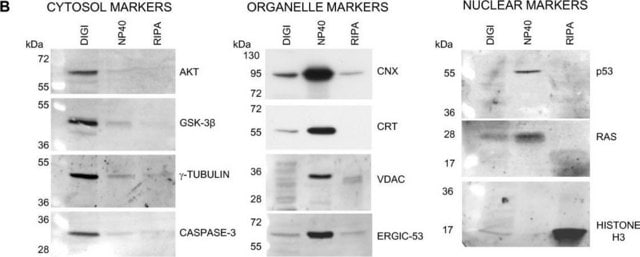OP40
Anti-Pan-Ras (Ab-3) Mouse mAb (RAS 10)
liquid, clone RAS 10, Calbiochem®
About This Item
Recommended Products
biological source
mouse
Quality Level
antibody form
purified antibody
antibody product type
primary antibodies
clone
RAS 10, monoclonal
form
liquid
contains
≤0.1% sodium azide as preservative
species reactivity
human, mouse, rat
manufacturer/tradename
Calbiochem®
storage condition
do not freeze
isotype
IgG2a
shipped in
wet ice
storage temp.
2-8°C
target post-translational modification
unmodified
Gene Information
human ... KRAS(3845)
General description
Immunogen
Application

Flow Cytometry (2.5 g/ml)
Frozen Sections (2.5 g/ml)
Immunoblotting (0.1-3 g/ml, chemiluminescent and colorimetric, see application references)
Immunofluorescence (2.5 g/ml, see application references)
Immunoprecipitation (1 g/sample)
Paraffin Sections (2.5 g/ml, saponin pre-treatment required)
Packaging
Warning
Analysis Note
SW480 or Y1 cells or breast carcinoma tissue
Other Notes
Sidransky, D., et al. 1992. Science256, 102.
Hamer, P.J., et al. 1990. Hybridoma9, 573.
Bos, J.L. 1989. Cancer Res.49, 4682.
Furth, M. E., et al. 1987. Oncogene1, 47.
Kraus, M.H., et al. 1984. Proc. Natl. Acad. Sci. USA81, 5384.
Shimizu, K., et al. 1983. Proc. Natl. Acad. Sci. USA80, 2112.
Taparowsky, E., et al. 1983. Cell34, 581.
Ellis, R.W., et al. 1981. Nature292, 506.
Shih, T.Y., et al. 1980. Nature287, 686.
Legal Information
Not finding the right product?
Try our Product Selector Tool.
Storage Class Code
11 - Combustible Solids
WGK
WGK 1
Flash Point(F)
Not applicable
Flash Point(C)
Not applicable
Certificates of Analysis (COA)
Search for Certificates of Analysis (COA) by entering the products Lot/Batch Number. Lot and Batch Numbers can be found on a product’s label following the words ‘Lot’ or ‘Batch’.
Already Own This Product?
Find documentation for the products that you have recently purchased in the Document Library.
Our team of scientists has experience in all areas of research including Life Science, Material Science, Chemical Synthesis, Chromatography, Analytical and many others.
Contact Technical Service








